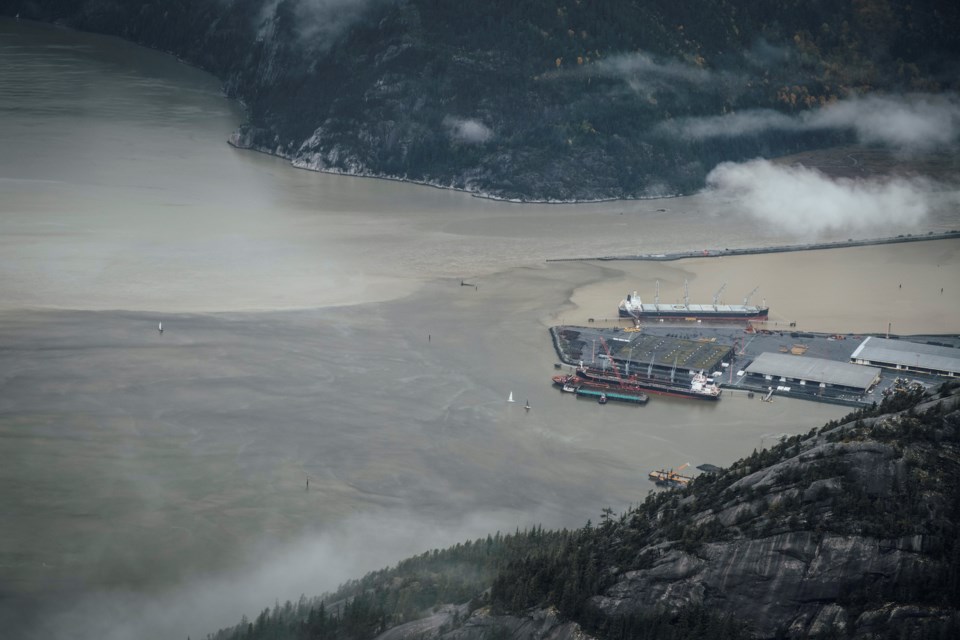In the short term, it appears as if shifting supply chain demands have created an unexpected boon for business at Squamish Terminals.
The president of Western Stevedoring, which owns the terminal, said initially, trade slowed down significantly for about six months after COVID hit. But then things started to build up again.
Dave Lucas said eventually, it reached a point where Squamish Terminals was able to take advantage of a new opportunity.
Lucas said that, like every other business, the Squamish Terminals was hit by the initial onset.
However, as time went on, it managed to benefit from the adaptations that businesses had to make as a result of the new circumstances.
The pandemic's changing demands created a shortage of containers and container ships.
Lucas said his business deals primarily in two commodities. These would be export forest products, like wood pulp, and imported steel products.
Instead of exporting forest products as usual, many shipping companies have been sending empty container shipping lines to Asia to take advantage of the skyrocketing import rates, he said.
Thus, this results in increased delays and higher costs for that service.
As a result, Lucas said that businesses started looking for other solutions to moving their goods around the world.
One of these solutions was to use breakbulk shipping, which is shipping in other forms, rather than containers, sometimes on racks or pallets or simply as is, for example, rolls of steel.
For Western Stevedoring's breakbulk ports, such as Squamish Terminals and the Lynnterm facility in North Vancouver, this was an opportunity.
"The extent of disruptions in the container sector caused customers to look at other options, [like] shipping by breakbulk, which is what we do — multi-purpose cargo vessels. Customers looked at breakbulk as an alternative," said Lucas.
"I guess they always have shipped some product in breakbulk, but the majority in containers. But more product has shifted from containers to breakbulk in the past year. So, [at] Squamish Terminals and Lynnterm, we've seen an increase in our cargo volumes in the past year as a result of that shift out of containers."
He said he could see the uptick in business lasting throughout this year. Lucas said there was a roughly 50% increase in imported steel volume.
On the docks
Regarding how the pandemic has affected staff and day-to-day operations, Lucas said that Squamish Terminals, like many other companies, has been affected.
There were challenges in putting the new protocols in place, and they worked with their employers' association, the B.C. Maritime Employers Association, to come up with universal guidelines across the terminals.
"It's worked very well," said Lucas. "Of course, there's a significant cost to that that we've had to bear."
However, with the Omicron variant, the company is ramping up its social distancing and masks protocols.
He estimated that less than 5% of the workforce has been affected by the virus. This includes both longshore and office workers.
They are having office staff work at home whenever possible and practical. For the longshore workforce, there are social distancing and mask-wearing protocols in place.
"We can ill afford to lose 10% or 20% of the overall workforce, given the volume of cargo flowing through terminals these days," Lucas said.
Weather impact
The recent extreme weather events have also reminded many people how delicate supply chains can be.
In the last year, fires, floods, and snow have been disruptions on a provincial scale.
In Squamish, recent arctic outflows have had crews cleaning snow off the docks around the clock, which has been a challenge, Lucas said.
Before then, the atmospheric rivers brought about extreme rain events that flooded highways, thus holding up vehicle traffic.
From the floods, Lucas said that there was a period of about three weeks where mills were unable to move product to the terminal.
Imported steel was also affected because the port's customers couldn't get product off the terminal to their customers in other parts of the province and Alberta.
"That led to a backlog of import steel in our facilities, and a period where no wood pulp was coming into the terminal," Lucas said.
The flows of wood pulp have started to normalize again, he said, but the movement of imported steel is still an issue due to the weather impacts on highways throughout B.C.
With respect to the summer fires, this created delays in rail cargo arriving at the terminal.
However, the impacts weren't as dramatic as the impacts from the autumn floods, he said.
On the maintenance front, dredging has been occurring. It started last month and is continuing this month. This is the first portion, and the remainder of the job will be done next winter.
Finally, with respect to the dismantling of the Spit, Lucas said the terminal is still examining studies on the matter and hasn't made a firm conclusion.



